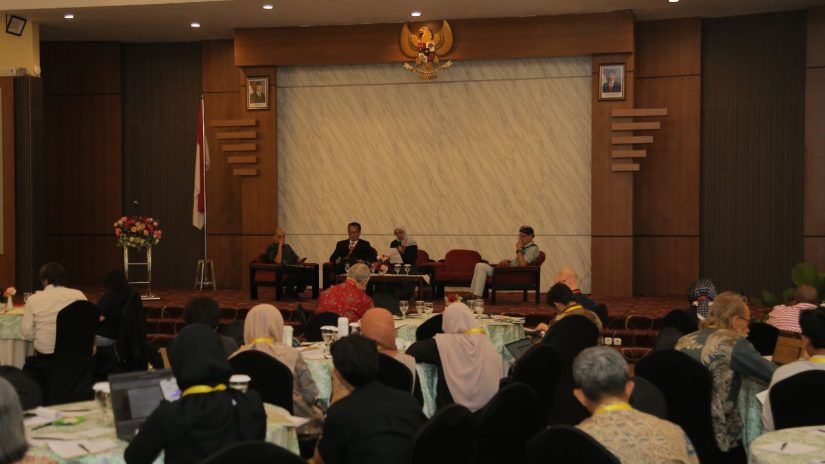
Rezza Prasetyo Setiawan
On 24–25 April 2025, ICRS organized an unconference titled “Polarization and Its Discontent in the Global South: Mitigation Measures, Strategies, and Policies.” The “unconference” format prioritizes free-flowing conversations instead of structured presentations, which exemplifies a decolonial shift toward reconfiguring colonial logic embedded within academic institutions. This article argues that an unconference setting provides a critique against academic elitism by decentralizing authority and fostering plural bodies of knowledge. The article highlights how the unconference setting contrasts the conventional conference in a collaborative effort toward the decolonization of Global South academia.
What is an Unconference?
In the opening remarks, Zainal Abidin Bagir, the director of ICRS, explained that an unconference focuses on conversations instead of formal presentations. The event consisted of plenary and parallel sessions. In the plenary sessions, a moderator guided a conversation among a group of panelists and the wider participants. In the parallel sessions, a general topic was given to each parallel room where all participants could choose to sit together to deliver their opinions on the topic, guided by a moderator to ensure that there was not any dominating voice. In both plenary and parallel sessions, the moderators became important figures who promoted unstructured, albeit still-on-topic, free-flowing conversations from all segments of the participants. Unlike traditional conferences, where knowledge flows unidirectionally from “experts” to passive listeners, the unconference format prefers a non-hierarchical structure through participatory dialogues.
This participatory setting situates the unconference not merely as an event but as an epistemological statement where knowledge is co-constructed, not only delivered unilaterally. Dicky Sofjan (Globethics & ICRS & Globethics) stated that the unconference setting deconstructs formal academic conferences and/or journal articles. Among the participants, there were vulnerable Indigenous communities present in the room, whose wisdom from their experience in the field in facing oppression became invaluable inputs for other academics who came from different backgrounds.
This becomes an important point, where the knowledge-making was not done only by “experts” who were validated only by academic degrees but also by their direct experience in the field. Indigenous and environmental activists were put at the center to share their wisdom and interests in the collective hope of reorienting the act of knowledge-making toward more practical solutions for the needs of the most vulnerable groups. This effectively shifted the focus of knowledge-making from a knowledge-making act from telescopic knowledge toward situated knowledge where knowledge touches real-world touches with real-world problems.
Decolonizing Academia
Contemporary academia continues to be shaped by Eurocentric epistemic norms that privilege textual and decontextualized knowledge. These norms marginalize alternative ways of knowing, especially those that are rooted in locality, community experience, and embodied praxis. The unconference format directly challenged these hierarchies, in line with Santos’ critique about the “monoculture of knowledge” and his preferred “ecology of knowledge” (2016), where different forms of knowledge interact equally.
The absence of rigid structures allowed for affective, reflexive, and non-competitive dialogue. Knowledge was not presented but co-created, not defended but negotiated. One participant stated in reflection that his experience in the unconference event contrasts sharply with the conventional conferences he usually attends. He recognized that the setting provides more room for encouragement than debates and contradiction. Rather than promoting intellectual elitism, the unconference setting privilege relationships, orality, and collective reflection over decontextualized critique and textuality-centeredness (Smith, 1999). This shift toward relationality disrupts the embedded logic of binaries such as “expert vs. layperson” or “rational vs. emotional” that are rooted in colonial academic traditions. Instead, the unconference setting promotes an ethics of entanglement and co-constitution, where knowledge emerges through listening, exchange, and mutual recognition. In doing so, the unconference disrupts the epistemic monoculture that marginalizes alternative epistemologies.
Therefore, the unconference operates as more than a novel format; it constitutes a decolonial praxis. It performs the values of epistemic humility, diversity, and justice by resisting the tendencies of academic coloniality. Rather than replacing one academic elite with another, the unconference opens the academic field to differences and diversity, promoting an ecosystem of decolonized bodies of knowledge. As an example of what Mignolo terms “epistemic disobedience” (2009), the unconference refused the colonial aspects of knowledge production by decentralizing authority and validating subaltern voices.
Conclusion
The unconference setting provides a powerful alternative to the institutional structures of academic elitism. By decentering traditional validations such as academic degrees, publication history, and disciplinary jargon, the conversations in the unconference encourage participatory, situated, and dialogical knowledge production. The unconference represents a broader movement in reimagining academia not as a site of performance or competition, but as a space of relational engagement. It prioritizes the epistemic contributions of those most affected by polarization, ecological degradation, and marginalization, whose voices are often excluded from formal academic venues.
This model does not only offer a critique but also a concrete alternative. It suggests that knowledge decolonization does not only include new voices but also transforms the very conditions in which knowledge is produced and circulated. An unconference reimagines how knowledge can be produced and shared in relational instead of hierarchical terms. By privileging co-construction over competition, participation over presentation, and shared vulnerability over authority, the unconference points toward an academic culture that is more just, more inclusive, and more responsive to the plural realities of the Global South. By centering participatory conversation over structured presentations, the unconference reveals the possibility of decolonizing academia, one conversation at a time.
